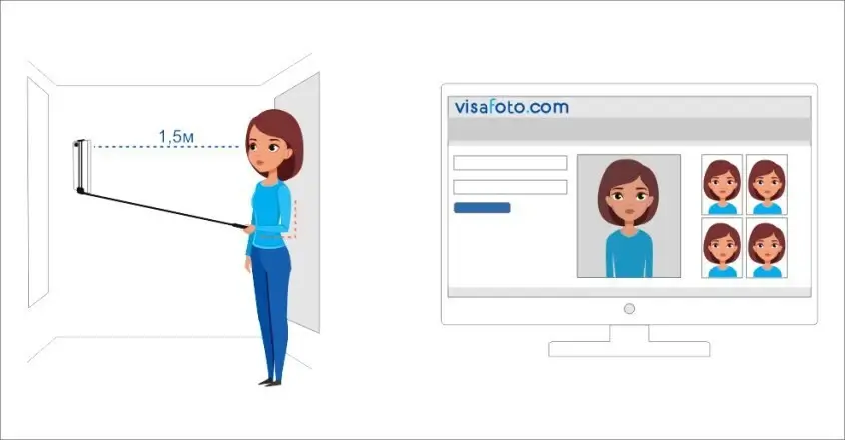How Much Does it Cost to Get a Schengen Visa: Fees Explained
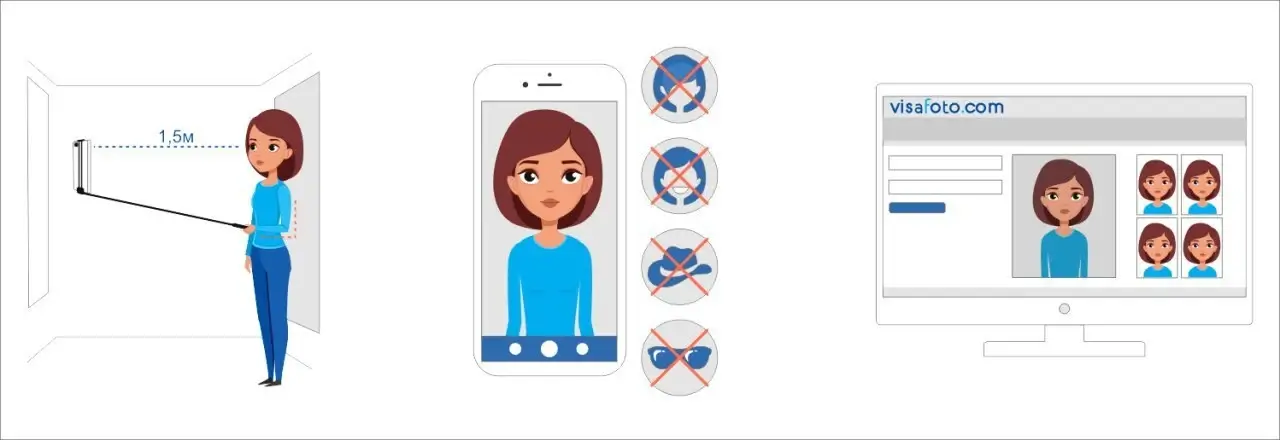
Applying for a Schengen visa involves more than just paperwork: there is also a range of fees that applicants need to be aware of. In this article, we’ll break down these costs so you know exactly what to expect before submitting your application.
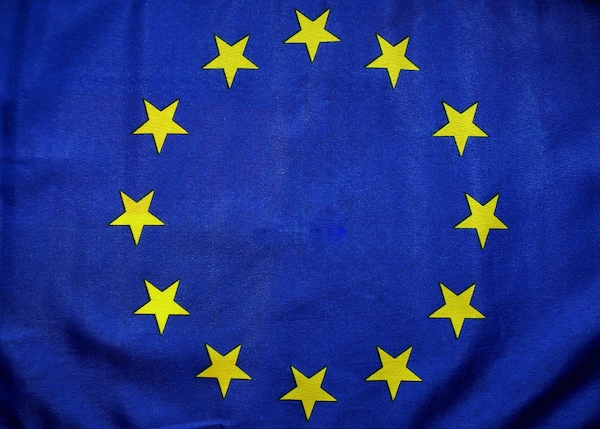
Table of contents
- Current Schengen visa fees
- Additional costs: photos, insurance, documents
- Online Schengen visa photo maker
- Schengen Visa Photo App
- Fee payment methods
- Schengen visa fee exemptions
- Special cases and reduced fees
- Recent visa fee updates
- FAQ
Current Schengen visa fees
How much does a Schengen visa cost for tourists? For a short-term Schengen Visa (Type C, valid for up to 90 days), the fees are as follows:
- The Schengen visa fee for adults is EUR 90.
- Schengen visa fee for children between 6 and 12 years is EUR 45.
- Children under 6 can obtain a visa for free.
The Schengen visa cost in USD is approximately. USD 104 for adults and about USD 52 for children aged 6–12.
These charges are uniform across all Schengen nations and apply to most applications for short visits, whether for tourism, business, or family purposes.
How much does a 5-year Schengen visa cost? The fee for a 5-year Schengen visa is EUR 90 for adults and EUR 45 for children aged 6–12, with children under 6 exempt from paying the fee. This amount is the same regardless of whether the visa is for a single-entry, double-entry, or multiple-entry. The same short-stay visa fee applies, irrespective of the duration or number of entries requested, in line with Schengen rules.
Additional costs: photos, insurance, documents
In addition to the Schengen visa charges, applicants need to plan for several required and optional expenses involved in the application process:
Passport photos
Applicants must provide recent passport-sized photos that adhere to Schengen requirements. The price for these pictures varies by location and provider, usually ranging from EUR 10 to EUR 20 per set.
Schengen travel insurance
All individuals applying for a Schengen visa must have travel medical insurance. This insurance has to cover medical costs of at least EUR 30,000 and be valid throughout the stay in the Schengen Area. The cost of travel insurance for a Schengen visa typically ranges from EUR 10 to EUR 50, based on the applicant's age, length of stay, and choice of provider.
Document preparation and copies
Applicants might need to spend on acquiring and photocopying necessary documents, such as:
- Accommodation proof (like hotel reservations or invitation letters).
- Financial proof (bank statements or employment letters).
- Flight reservations or travel plans.
- Civil status documents (like birth or marriage certificates, if required).
- There might be additional charges for notarising, translating, or certifying documents, particularly if they're not in an official Schengen language. These expenses can differ significantly based on the location and the number of documents involved.
Service fees from application centres
When applying through a visa application centre (such as VFS Global), there's an extra service charge on top of the visa fee. Generally, this service fee is between EUR 20 and EUR 40 per application, varying with the provider and location.
Thus, although the actual cost varies depending on the country in which you apply, your personal circumstances and the optional services you select, the average cost of a Schengen visa in total is typically between EUR 120 and EUR 200 per person.
Online Schengen visa photo maker
With the advancements in smartphones and digital tools, getting your visa photo is now easier and more cost-effective. Using Visafoto.com, you can quickly create a professional Schengen visa photo with a high approval rate of 99.7%. Since 2013, Visafoto has been helping people around the world with passport, visa, and ID photos.
To use this service, simply take a photo against a solid white background using your phone or camera, then upload it to Visafoto.com. The tool will do the rest, automatically adjusting the background, optimising the resolution, and cropping the photo to meet the required dimensions.
Example of the photo you can provide:
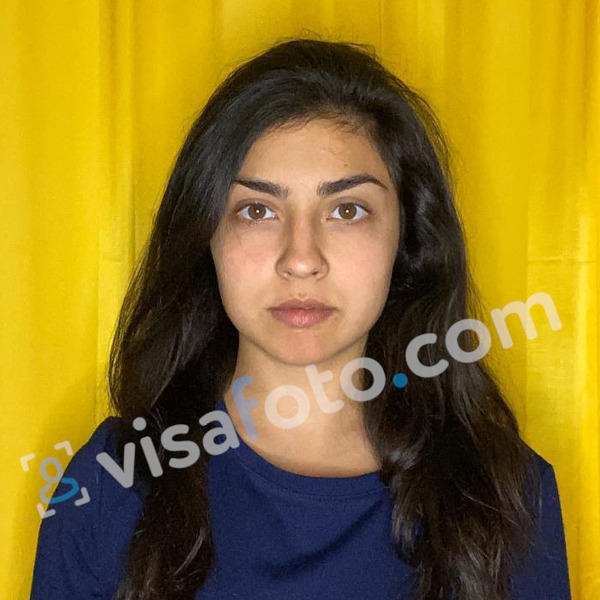
You will receive both a digital version for online applications and a print-ready file. If the photo doesn't meet your satisfaction, we'll provide a replacement at no cost. Should officials reject the photo, you can get a full refund.
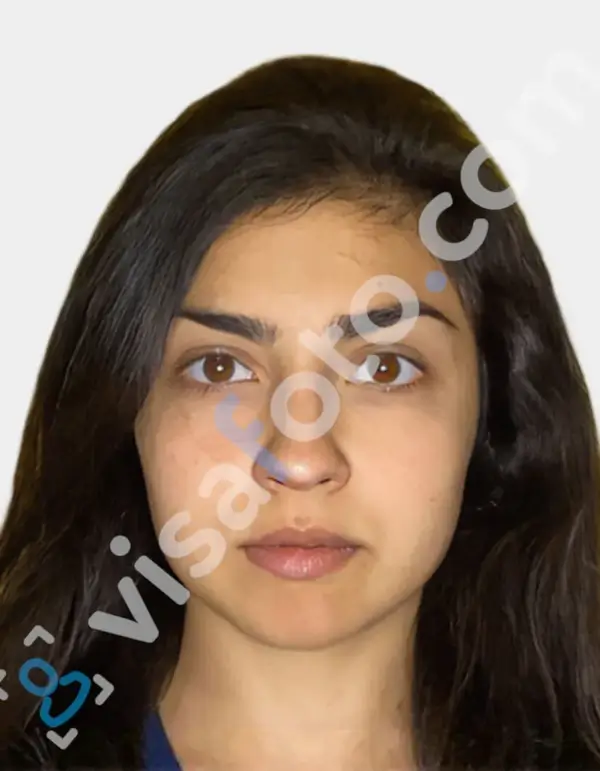
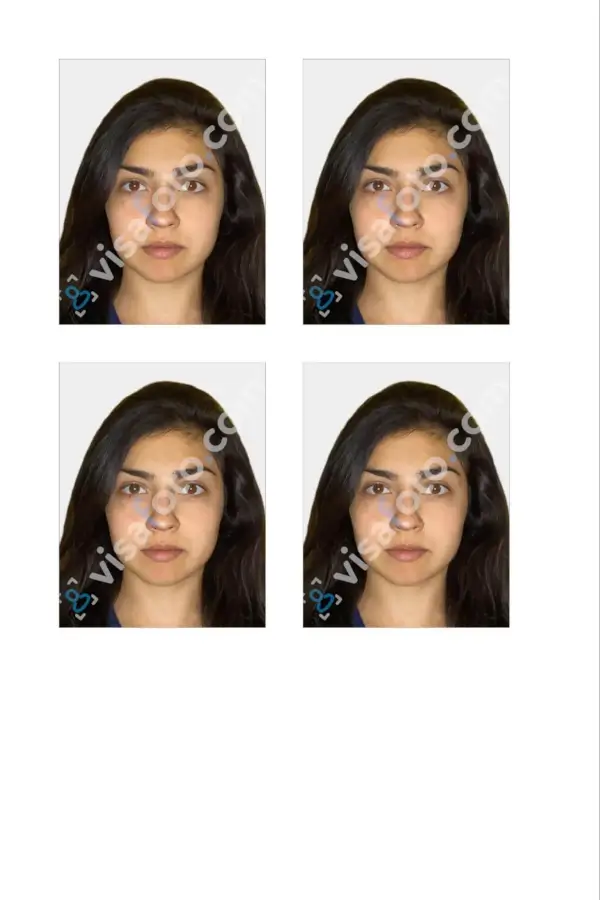
Schengen Visa Photo App
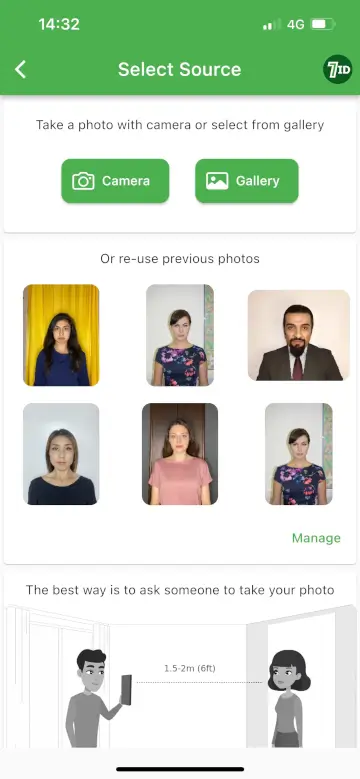
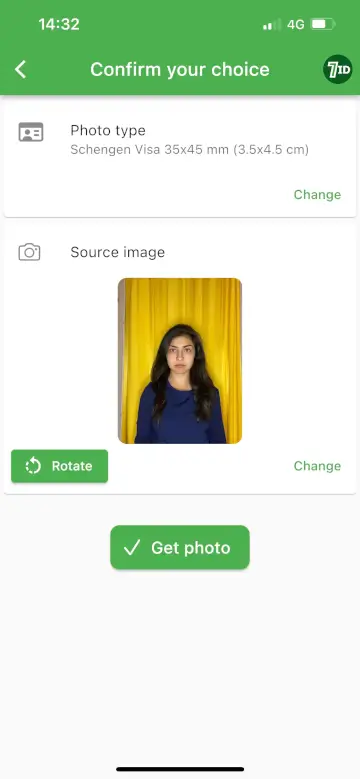
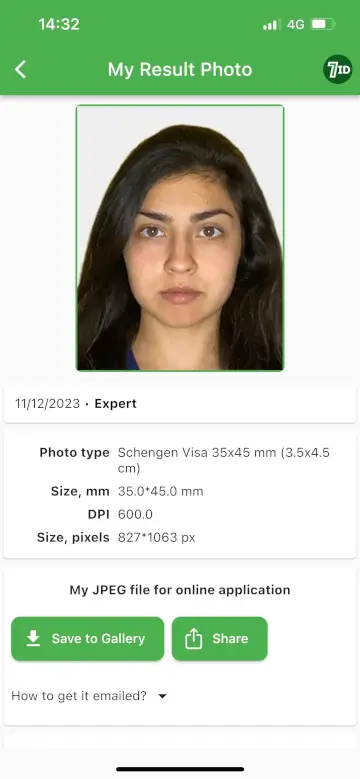
Another excellent option for creating a valid Schengen visa photo is the 7ID App, available from Visafoto.com. This app enables you to take and edit visa, passport, or ID photos directly on your iPhone or Android device, making it a quick and affordable option.
With 7ID, just upload your image, select your document type and country, and the app will ensure your photo aligns with official standards regarding size, format, and background. It also ensures that your face and eyes are perfectly centred.
You’ll receive a digital file alongside a print template suitable for standard paper sizes like 4×6, A4, A5, or B5. Our technical support team is available round the clock if you have any questions or require assistance.
Fee payment methods
How you pay your Schengen visa fees can vary based on the country, consulate, and application centre. Common methods include:
- Credit/Debit cards. Many consulates and visa application centres (VACs), such as those in the Netherlands and Germany, accept Visa or Mastercard for in-person payments. Note that some locations may not take American Express, Discover, or Diners Club cards.
- Money orders or cashier’s checks. Certain consulates, like the Italian Consulate General, accept payment through money orders or cashier’s checks, made payable to the specific consulate. Cash is only an option in rare cases with prior approval.
- Online payments. Some VACs permit you to pay fees online in advance, usually with a credit or debit card.
- Cash. Rarely accepted, typically only with special authorization or in particular countries. Due to security reasons, most VACs and consulates do not handle cash transactions.
- Personal checks. These are generally not accepted at consulates or VACs.
Schengen visa fee exemptions
Certain groups of applicants are completely exempt from paying Schengen visa fees. These exemptions are consistent across all Schengen countries and apply to people of any nationality:
- Children who are under six years old.
- School students, university students, and accompanying teachers travelling for study or training.
- Members of non-profit organisations who are 25 or younger involved in seminars, conferences, sports, cultural, or educational events organised by these organisations.
- Researchers (as defined in Article 3(2) of EU Directive 2016/801) travelling for research or participating in scientific seminars or conferences.
- People who need to replace a valid visa with a full travel document when the previous one has no available pages, requiring a new visa in a new passport.
- Spouses, registered partners, and dependent children of EU/EEA nationals, along with the parents of minor EU/EEA nationals, provided they have rights of free movement.
- Foreign exhibitors at German trade fairs holding an official trade fair pass (specific to Germany).
Some countries might have specific agreements or national rules allowing additional exemptions or lower fees for certain groups, like official delegations or humanitarian cases.
Special cases and reduced fees
Citizens from the following countries qualify for a reduced Schengen visa fee of EUR 35:
- Albania
- Armenia
- Azerbaijan
- Bosnia and Herzegovina
- Georgia
- Moldova
- Montenegro
- North Macedonia
- Serbia
- Ukraine
Important clarifications:
- Citizens of Albania, Bosnia and Herzegovina, Georgia, Moldova, Montenegro, North Macedonia, Serbia, and Ukraine benefit from visa-free travel to the Schengen Area for up to 90 days within any 180-day period, provided they hold a biometric passport. In these cases, no visa, and therefore no fee, is required.
- The €35 reduced fee still applies to nationals of these countries who hold non-biometric passports, or in special cases such as long-stay visa applications, or where the visa-free regime does not apply.
- Armenia and Azerbaijan are not part of the Schengen visa waiver scheme, so their citizens still require visas and generally qualify for the €35 reduced fee under the terms of their visa facilitation agreements with the EU.
The reduced fee applies regardless of the applicant’s country of residence or where they submit their visa application.
Recent visa fee updates
Starting from June 11, 2024, the Schengen visa price increased to EUR 90 for adults and to EUR 45 for children aged six to under 12. The visa fees under existing visa facilitation agreements remain unchanged at EUR 35.
FAQ
Is the Schengen visa fee the same for every country in the zone?
Yes, the standard fee for a Schengen visa is uniform across all countries in the Schengen area: EUR 90 for adults and EUR 45 for children aged 6–12, with children under 6 exempt from the fee. Whether you choose a Schengen visa single entry vs multiple entry, the cost remains the same for both options. Additionally, citizens from certain countries with visa facilitation agreements can benefit from a reduced fee of EUR 35, while applicants from countries that do not cooperate with EU migration policies might face higher fees.
Is the visa fee refundable if I get rejected?
No, the fee for a Schengen visa is non-refundable if your application gets rejected. It is used to cover the processing and administrative costs, regardless of whether the visa is approved or denied.
Do I have to pay extra if I apply through VFS or TLScontact?
Yes, applying through VFS or TLScontact includes additional service fees on top of the standard Schengen visa fee. Other optional services, such as courier delivery or SMS alerts, may also incur additional fees.
Can I pay the Schengen visa fee online?
Sometimes, you can pay the Schengen visa fee online, particularly when scheduling appointments or using services like TLScontact, which require service fees to be paid online. However, the main visa fee is typically paid by credit or debit card at the visa application centre or consulate, rather than paid online in advance. It's essential to check the payment instructions specific to your application location.
Are there any discounts for students or researchers?
Yes, discounts and fee exemptions are available for students and researchers. Schengen visa fees are waived for:
- School students, undergraduates, postgraduates, and accompanying educational staff travelling for study or training.
- Researchers undertaking scientific research.
- Representatives from non-profit organisations under 25 attending seminars, conferences, or educational events.
To receive these benefits, you must provide documents proving your eligibility.
I’m from a country with a visa facilitation agreement. Do I get a discount?
Yes, if your country has a visa facilitation agreement with the EU, you are eligible for the cheapest Schengen visa fee, which is EUR 35. The application process may also be more streamlined for you.
